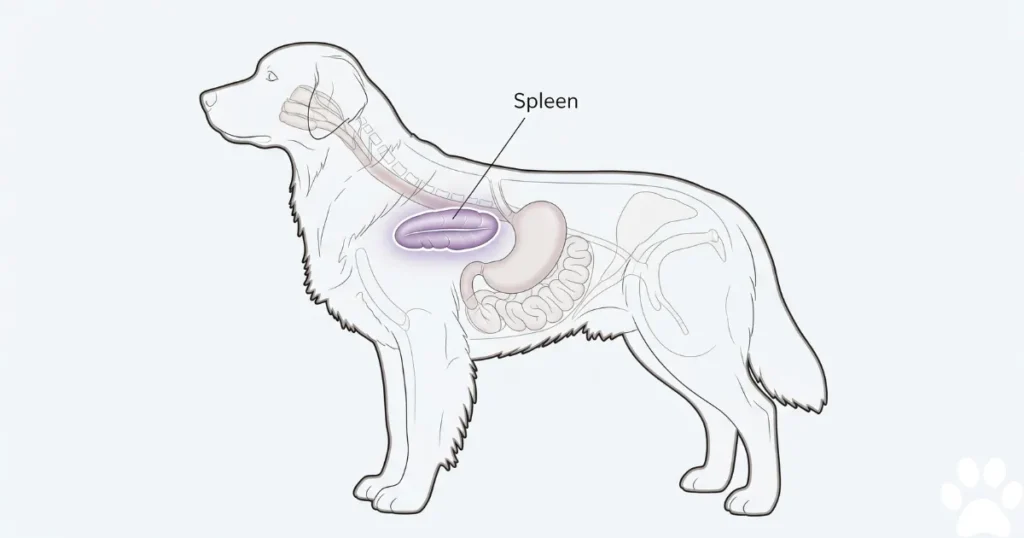Navigating the final stages of spleen cancer in dogs is an emotionally challenging journey that no Golden Retriever owner wants to face. Spleen cancer, particularly hemangiosarcoma, affects Golden Retrievers at disproportionately high rates, making this knowledge crucial for breed enthusiasts and loving families who want to provide the best possible care during their companion’s final chapter.
Understanding what to expect during the final stages of spleen cancer in dogs empowers owners to make informed decisions about treatment, comfort care, and end-of-life planning. While this information may be difficult to process, knowledge provides the foundation for compassionate care that honors your Golden Retriever’s dignity while managing their comfort needs.
This comprehensive guide offers practical insights, emotional support, and clinical understanding to help families recognize when their beloved Golden Retriever is entering the final stages of spleen cancer, along with guidance on how to navigate this heartbreaking but important time with love and grace.
Contents
- 1 Understanding Spleen Cancer in Golden Retrievers
- 2 Recognizing the Final Stages of Spleen Cancer in Dogs
- 3 Cardiovascular and Circulatory Complications
- 4 Digestive and Metabolic Changes
- 5 Pain and Comfort Assessment
- 6 Quality of Life Considerations
- 7 End-of-Life Decision Making
- 8 Palliative and Hospice Care Options
- 9 Supporting Family Members Through the Journey
- 9.1 Preparing Children and Family
- 9.2 Creating Meaningful Memories
- 9.3 How long do dogs typically live in the final stages of spleen cancer?
- 9.4 What are the most obvious signs that my Golden Retriever is in end-stage spleen cancer?
- 9.5 Can spleen cancer cause sudden death in Golden Retrievers?
- 9.6 Should I consider spleen removal surgery during the final stages?
- 9.7 How can I tell if my Golden Retriever is suffering from spleen cancer?
- 9.8 What should I expect during the final days of spleen cancer?
- 9.9 Is it better to euthanize before a crisis or wait for natural death?
- 9.10 How can I provide the best comfort care at home?
- 10 Final Thoughts
Understanding Spleen Cancer in Golden Retrievers
Spleen cancer in Golden Retrievers most commonly manifests as hemangiosarcoma, an aggressive blood vessel tumor that affects this breed at rates significantly higher than most other dog breeds. The spleen’s rich blood supply and the Golden Retriever’s genetic predisposition create a perfect storm for this devastating cancer type.
The final stages of spleen cancer in dogs typically develop rapidly once the disease reaches advanced stages. Unlike some cancers that progress slowly over months or years, spleen cancer can accelerate quickly, sometimes progressing from early symptoms to end-stage disease within weeks.
Golden Retrievers with spleen cancer face unique challenges due to the organ’s critical role in blood filtration, immune function, and blood storage. When cancer compromises spleen function, multiple body systems become affected, creating cascading health complications that characterize the final disease stages.
The location and function of the spleen make early detection particularly challenging, as symptoms often don’t appear until the cancer has already progressed significantly. This delayed symptom onset means that many Golden Retrievers are diagnosed when the disease is already approaching advanced stages. Always check for signs of cancer in dogs.

Recognizing the Final Stages of Spleen Cancer in Dogs
Acute Symptoms and Emergency Signs
The final stages of spleen cancer in dogs often present with sudden, acute symptoms that require immediate veterinary attention. Golden Retrievers may appear relatively normal one day and experience life-threatening complications the next, making recognition of these warning signs critical for family preparedness.
Emergency symptoms include:
- Sudden collapse or weakness without an obvious cause
- Pale or white gums indicate severe anemia
- Rapid, weak pulse or irregular heartbeat
- Labored breathing or respiratory distress
- Abdominal distension or swelling
- Cold extremities or shivering
- Disorientation or confusion
These acute episodes often result from tumor rupture and internal bleeding, creating medical emergencies that can be fatal within hours if untreated. The unpredictable nature of these episodes makes them particularly traumatic for families who may witness their previously stable Golden Retriever suddenly deteriorating.
Progressive Weakness and Lethargy
Beyond acute episodes, the final stages of spleen cancer in dogs involve progressive weakness that gradually limits your Golden Retriever’s ability to participate in normal activities. This weakness stems from chronic anemia, reduced oxygen-carrying capacity, and the cancer’s metabolic demands on the body.
Progressive symptoms include:
- Increasing reluctance to exercise or play
- Difficulty rising from lying positions
- Shortened walks or frequent rest breaks
- Loss of interest in favorite activities
- Spending most of the day sleeping or resting
- Reduced response to social interaction
Golden Retrievers are naturally active and social dogs, making these energy changes particularly noticeable to observant owners. The gradual decline in enthusiasm for life activities often serves as a reliable indicator of disease progression.

Cardiovascular and Circulatory Complications
Internal Bleeding Episodes
One of the most serious aspects of the final stages of spleen cancer in dogs involves recurrent internal bleeding episodes that occur when tumors rupture or leak blood into the abdominal cavity. These episodes can range from slow, chronic bleeding to sudden, massive hemorrhage.
Internal bleeding signs include:
- Gradual development of pale gums over hours or days
- Abdominal swelling that comes and goes
- Weakness that worsens progressively
- Loss of appetite and nausea
- Restlessness or inability to get comfortable
- Dark or tarry stool indicating blood loss
These bleeding episodes often follow a pattern of acute crisis followed by apparent stabilization, creating false hope for families. However, each episode typically weakens the dog further and indicates continued disease progression.
Anemia and Oxygen Transport Issues
The final stages of spleen cancer in dogs invariably involve severe anemia as the cancer destroys red blood cells faster than the body can replace them. This anemia creates widespread oxygen delivery problems that affect every organ system.
Anemia-related complications include:
- Extreme fatigue and weakness
- Rapid heart rate as the heart works harder to pump blood
- Breathing difficulties, especially during mild exertion
- Cold tolerance problems and frequent shivering
- Mental dullness or confusion due to brain oxygen deficiency
- Delayed healing and increased infection susceptibility
The severity of anemia often correlates directly with quality of life, as severely anemic dogs struggle to maintain basic bodily functions and a comfortable existence.

Digestive and Metabolic Changes
Appetite Loss and Nutritional Challenges
During the final stages of spleen cancer in dogs, Golden Retrievers typically experience significant appetite changes that compound their physical weakness. The combination of cancer metabolism, medication side effects, and general illness creates complex nutritional challenges.
Appetite-related changes include:
- Complete loss of interest in regular food
- Refusal of previously enjoyed treats
- Nausea and vomiting after eating
- Difficulty swallowing or keeping food down
- Preference for liquid over solid foods
- Rapid weight loss despite nutritional support efforts
These feeding difficulties often distress families who want to provide comfort through food offerings. However, forcing food during end-stage disease may increase discomfort without providing a meaningful benefit.
Metabolic Dysfunction
The final stages of spleen cancer in dogs involve widespread metabolic dysfunction as the cancer affects multiple organ systems simultaneously. The spleen’s role in immune function and blood cell regulation becomes compromised, creating systemic health problems.
Metabolic complications include:
- Liver function abnormalities affecting toxin processing
- Kidney dysfunction limiting waste elimination
- Electrolyte imbalances cause weakness and confusion
- Blood clotting abnormalities increase the bleeding risk
- Immune system suppression increases infection susceptibility
- Temperature regulation problems causing fever or hypothermia
These metabolic changes often make medical management increasingly difficult as the disease progresses, limiting treatment options and medication choices.
Pain and Comfort Assessment
Understanding Spleen Cancer Pain
Pain management during the final stages of spleen cancer in dogs requires understanding that Golden Retrievers may experience multiple types of discomfort simultaneously. Spleen cancer pain can be acute and severe during bleeding episodes or chronic and aching from tumor pressure and inflammation.
Pain indicators specific to spleen cancer include:
- Restlessness and inability to find comfortable positions
- Reluctance to lie on the side where the spleen is located
- Arched back posture indicating abdominal discomfort
- Panting at rest, especially when combined with weakness
- Sensitivity to touch around the abdomen
- Changes in normal sleeping and resting patterns
Golden Retrievers often hide their discomfort, making careful observation of subtle behavioral changes crucial for pain assessment. Changes in facial expression, body posture, and interaction patterns may indicate pain levels better than obvious distress signals.
Medication Limitations and Challenges
Managing pain during the final stages of spleen cancer in dogs becomes increasingly challenging as the disease progresses and organ function declines. Traditional pain medications may be contraindicated due to liver, kidney, or clotting abnormalities associated with advanced spleen cancer.
Pain management complications include:
- Liver dysfunction limiting medication processing
- Kidney problems restrict drug choices
- Bleeding risks from anti-inflammatory medications
- Drug interactions with other necessary treatments
- Reduced medication effectiveness due to poor absorption
- Side effects that may worsen quality of life
These limitations often force difficult decisions about balancing pain relief with medication risks, sometimes leaving families feeling helpless when their Golden Retriever experiences discomfort.

Quality of Life Considerations
Mobility and Independence Assessment
Assessing quality of life during the final stages of spleen cancer in dogs requires honest evaluation of your Golden Retriever’s ability to maintain basic functions and experience joy in simple activities. Mobility limitations often signal significant disease progression and impact overall wellbeing.
Key mobility factors include:
- Ability to rise and move independently
- Interest in short walks or outdoor exploration
- The capacity to reach food, water, and elimination areas without distress
- Comfort when resting in various positions
- Response to gentle physical interaction and petting
- Maintenance of basic hygiene and grooming behaviors
Golden Retrievers naturally want to please their families and may attempt activities beyond their capabilities. Distinguishing between determined effort and genuine comfort helps guide quality of life assessments.
Emotional and Social Engagement
The final stages of spleen cancer in dogs often affect your Golden Retriever’s emotional state and social interactions. These changes may be subtle initially but become more pronounced as the disease progresses and discomfort increases.
Social engagement indicators include:
- Interest in family activities and interactions
- Response to favorite people arriving home
- Willingness to accept affection and petting
- Participation in household routines
- Alert awareness of surroundings
- Maintenance of personality traits and preferences
Loss of interest in social interaction often indicates significant discomfort or disease progression, as Golden Retrievers naturally seek companionship and family involvement even when feeling unwell.

End-of-Life Decision Making
Recognizing When Suffering Outweighs Quality of Life
Making end-of-life decisions during the final stages of spleen cancer in dogs requires balancing love for your Golden Retriever with a realistic assessment of their comfort and quality of life. The goal is to prevent unnecessary suffering while honoring the special bond you share.
Consider end-of-life options when:
- Bleeding episodes become frequent and difficult to manage
- Pain can not be adequately controlled with available medications
- Your Golden Retriever shows no interest in food, water, or interaction
- Breathing becomes labored even at rest
- Mobility is severely compromised, and comfort can not be maintained
- More bad days than good days occur consistently
These decisions often involve weighing short periods of stability against increasing episodes of distress, requiring families to focus on overall trends rather than momentary improvements.
Euthanasia Planning and Considerations
When the final stages of spleen cancer in dogs progress beyond manageable comfort levels, euthanasia provides a peaceful, dignified end to suffering. This difficult decision reflects profound love and commitment to your Golden Retriever’s wellbeing.
Euthanasia considerations include:
- Timing decisions based on quality of life rather than arbitrary timelines
- Location preferences for the procedure (home vs. clinic).
- Family members who wish to be present.
- Special preparations or rituals that provide comfort.
- Aftercare planning for your dog’s remains.
- Memorial arrangements to honor your companion’s life.
Many families benefit from discussing these decisions before crises arise, allowing for thoughtful planning rather than emergency decision-making during acute episodes.

Palliative and Hospice Care Options
Home Comfort Care Strategies
Providing comfort care at home during the final stages of spleen cancer in dogs allows Golden Retrievers to remain in familiar surroundings while receiving supportive care focused on comfort rather than cure. This approach emphasizes quality of life and family time.
Home care strategies include:
- Soft, supportive bedding to reduce pressure and increase comfort.
- Easy access to food, water, and elimination areas.
- Temperature control to accommodate poor circulation.
- Gentle massage and physical therapy as tolerated.
- Maintaining familiar routines and schedules when possible.
- Providing constant companionship and emotional support.
Environmental modifications help accommodate your Golden Retriever’s changing needs while preserving dignity and comfort during their final weeks or months.
Professional Hospice Services
Veterinary hospice and palliative care services provide specialized support for families navigating the final stages of spleen cancer in dogs. These services focus on comfort management, pain relief, and quality of life optimization rather than curative treatments.
Professional hospice care includes:
- Regular veterinary visits for comfort assessment and medication adjustment.
- 24-hour consultation availability for urgent concerns.
- Pain management expertise and medication guidance.
- Emotional support and counseling for family members.
- End-of-life planning and decision-making assistance.
- Coordination of euthanasia services when appropriate.
These specialized services help ensure optimal comfort care while providing families with professional guidance and emotional support throughout the process.

Supporting Family Members Through the Journey
Preparing Children and Family
The final stages of spleen cancer in dogs affect entire families, requiring age-appropriate communication and emotional support for all members as they prepare to say goodbye to their beloved Golden Retriever.
Family preparation strategies include:
- Honest, age-appropriate discussions about the dog’s condition.
- Involving family members in comfort care activities.
- Creating opportunities for special memories and bonding time.
- Explaining the progression of illness in understandable terms.
- Providing emotional support resources for all family members.
- Planning memorial activities to honor the dog’s life.
Professional counseling, pet loss support groups, and veterinary social workers can provide valuable guidance for families struggling with anticipatory grief and end-of-life decisions.
Creating Meaningful Memories
During the final stages of spleen cancer in dogs, focusing on creating positive memories helps families process grief while celebrating their Golden Retriever’s life and impact on the family. These activities can provide comfort during difficult times.
Memory-making activities include:
- Photography sessions capturing special moments.
- Paw print impressions or nose print keepsakes.
- Writing letters or journals about favorite memories.
- Creating photo albums or memory books.
- Recording videos of your dog’s personality.
- Sharing stories about your Golden Retriever’s unique qualities.
These activities help families focus on celebration rather than solely on loss, providing positive coping mechanisms during challenging times.
How long do dogs typically live in the final stages of spleen cancer?
The final stages of spleen cancer in dogs can last from several weeks to a few months, depending on factors like tumor size, metastatic spread, and individual response to treatment. Golden Retrievers with advanced spleen cancer typically survive 1-3 months with palliative care, though timelines vary significantly based on individual circumstances.
What are the most obvious signs that my Golden Retriever is in end-stage spleen cancer?
The most obvious signs of the final stages of spleen cancer in dogs include sudden episodes of weakness or collapse, pale gums, difficulty breathing, abdominal swelling, and extreme lethargy. These symptoms often indicate internal bleeding or severe anemia associated with advanced disease progression.
Can spleen cancer cause sudden death in Golden Retrievers?
Yes, the final stages of spleen cancer in dogs can cause sudden death due to massive internal bleeding when large tumors rupture. This complication can occur with little warning, making it important for families to understand the risks and consider quality of life decisions proactively.
Should I consider spleen removal surgery during the final stages?
Surgery during the final stages of spleen cancer in dogs is typically not recommended when the cancer has already metastasized or when the dog’s overall condition is severely compromised. Most veterinarians focus on comfort care rather than aggressive treatments at this stage.
How can I tell if my Golden Retriever is suffering from spleen cancer?
Signs of suffering during the final stages of spleen cancer in dogs include restlessness, inability to get comfortable, persistent panting, loss of interest in all activities, difficulty breathing, and obvious pain responses to gentle touch. Quality of life assessment tools can help evaluate suffering levels objectively.
What should I expect during the final days of spleen cancer?
During the final days of final stages of spleen cancer in dogs, expect increasing weakness, decreased appetite, difficulty breathing, and possible episodes of internal bleeding. Many dogs become increasingly sleepy and less responsive to their surroundings as their body systems shut down.
Is it better to euthanize before a crisis or wait for natural death?
Most veterinarians recommend considering euthanasia before crises during the final stages of spleen cancer in dogs to prevent unnecessary suffering. Waiting for natural death may result in painful bleeding episodes or distressing symptoms that could be prevented through compassionate euthanasia.
How can I provide the best comfort care at home?
Providing optimal comfort care during the final stages of spleen cancer in dogs involves maintaining a quiet, comfortable environment, offering easy access to food and water, providing soft bedding, managing pain medication as prescribed, and offering gentle companionship while respecting your dog’s need for rest.
Final Thoughts
Understanding the final stages of spleen cancer in dogs empowers Golden Retriever families to provide compassionate, informed care during one of life’s most difficult chapters. While this journey is heartbreaking, knowledge allows families to focus on comfort, dignity, and quality time rather than being overwhelmed by uncertainty and fear.
Remember that every Golden Retriever’s experience with end-stage spleen cancer is unique, and your dog’s timeline and symptoms may differ from typical patterns. The most important considerations are maintaining comfort, preventing suffering, and honoring the special bond you share with your beloved companion.
Throughout the final stages of spleen cancer in dogs, trust your instincts as a loving pet owner while working closely with your veterinary team to make decisions that prioritize your Golden Retriever’s wellbeing. The courage to face this difficult time with compassion and love reflects the depth of the human-canine bond that has enriched your lives together.
Focus on the joy your Golden Retriever has brought to your family, the memories you’ve created together, and the privilege of providing comfort and love during their final journey. While saying goodbye is devastating, the love you share transcends the physical limitations imposed by cancer, creating lasting memories that honor your companion’s life and legacy.
Dr. Nabeel A.
Hi, I’m Dr. Nabeel Akram – a farm management professional by trade and a passionate Golden Retriever enthusiast at heart. With years of experience in animal science and livestock care, I’ve built a career around understanding animals—how they live, thrive, and bring value to our lives. This blog is a personal project born from that same passion, focusing on one of the most loyal and lovable breeds out there: the Golden Retriever. Whether I’m managing farm operations or sharing insights on canine health, behavior, and care, it all ties back to one core belief—animals deserve thoughtful, informed, and compassionate attention. Welcome to a space where professional expertise meets genuine love for dogs.
Facebook |


Links will be automatically removed from comments.